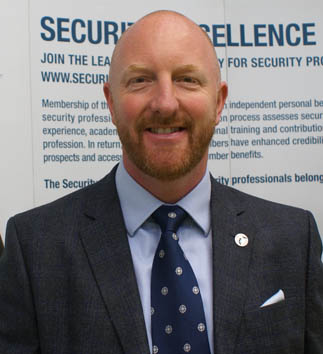Rick Mounfield became the new chief executive of the Security Institute on May 1, taking over from interim man Andrew Nicholls. He’s pictured at the Institute’s stand at the Counter Terror Expo earlier this week. More in the June 2017 print issue of Professional Security magazine, but Mark Rowe had a first word and took the picture.
Note Rick’s wearing the Institute tie and the Chartered Security Professional (CSyP) lapel badge. Besides that impeccable record, he also has a master’s in security management from Loughborough University.
Rick has a to-do list of short and longer-term things to do – the things he would like to see as a member, which he’s been for seven years. To name just a couple: how the Institute communicates, with members and the wider world – he’s looking to do more social media; and a knowledge library. The Institute does have such a thing, but how many know about it, and where to find it online?
His background is the military, and the Royal Military Police (RMP) in particular. He’s gone to the Institute from Eden Private Staff, where he was head of security for that recruitment agency that provided staff for private households, such as nannies and housekeepers – itself a comment on the modern life of the VIP, and high net worth businessman, requiring a ‘family security advisor’ besides cleaners, chefs and personal assistants. Hence partly why Rick has done a fair amount of networking and aiding military and in particular RMP leavers into ‘civvy street’. Such a background also informs his ops-based experience of and insight into private security. He raised with Professional Security the scenario of small but entrepreneurial and fast-growing companies recruiting a security manager, as their sole security person, maybe someone new out of the Army, who has gone some way to qualify himself to do the job of security management, by gaining a diploma in the subject.
But Professional Security interrupted with a football metaphor – in some ways, it’s easier for Jose Mourinho to manage Manchester United than, let’s say, Nuneaton Town. The Premier League club comes with more pressure, a bigger budget, but there’s also more staff to cover things. Whereas in the smaller organisation, to return to the security guy new to the firm and on his own, he has to have an answer for every specialism, everything from travel security policy to what to do about the CCTV camera in reception that isn’t giving very good images when the sun shines in the afternoon, to cyber, to who’s stealing the sandwiches in the office fridge. To return to Rick; hence the call for the Institute ‘knowledge library’, policies, procedures, advice documents that save the security manager time and work, working out his own.
The MD of the Institute before Andrew Nicholls stepped into the breach last year was David Thorp, who left after a couple of years to become Executive Director of another industry body, the Business Continuity Institute (BCI). That he chose such a move should have caused the Institute, and those in the UK private security sector who see business continuity (BC) as merely a branch of wider business security, to take pause. If BC is smaller than security management, why David’s move to a (presumably) larger and better paid industry body? That is not to knock people with a specialist background in management of industry bodies – James Kelly ably oversees as BSIA chief executive the association’s important yet sometimes unglamorous and thankless work of keeping up with technical standards and representing the industry to the wider world.
That Rick from the start has raised the issue of the newcomer to the sector, who paradoxically has arguably the hardest task of all, being a jack of all trades, bodes well; as such security people are easily overlooked, and least know where to look for help. Hence the worth of them joining an industry body, to tap into the body of knowledge; and among other things to show proficiency, through the CSyP status.
The Security Institute has always been a broad church, as reflected in the background of its chairs. To go through them; Bill Wyllie was in banking security, now consulting internationally; Mike Bluestone, consultant and trainer, is now at the contract security company Corps Security; Emma Shaw, another who came from the armed forces, set up her own counter-surveillance and bug-sweeping company, Esoteric; and since 2015 Garry Evanson, the head of security at Westminster Abbey. As Rick settles into his role, to serve members, and for example meets the Institute’s support staff, at their office outside Nuneaton, Institute members can be reassured that one of them is chief exec.










